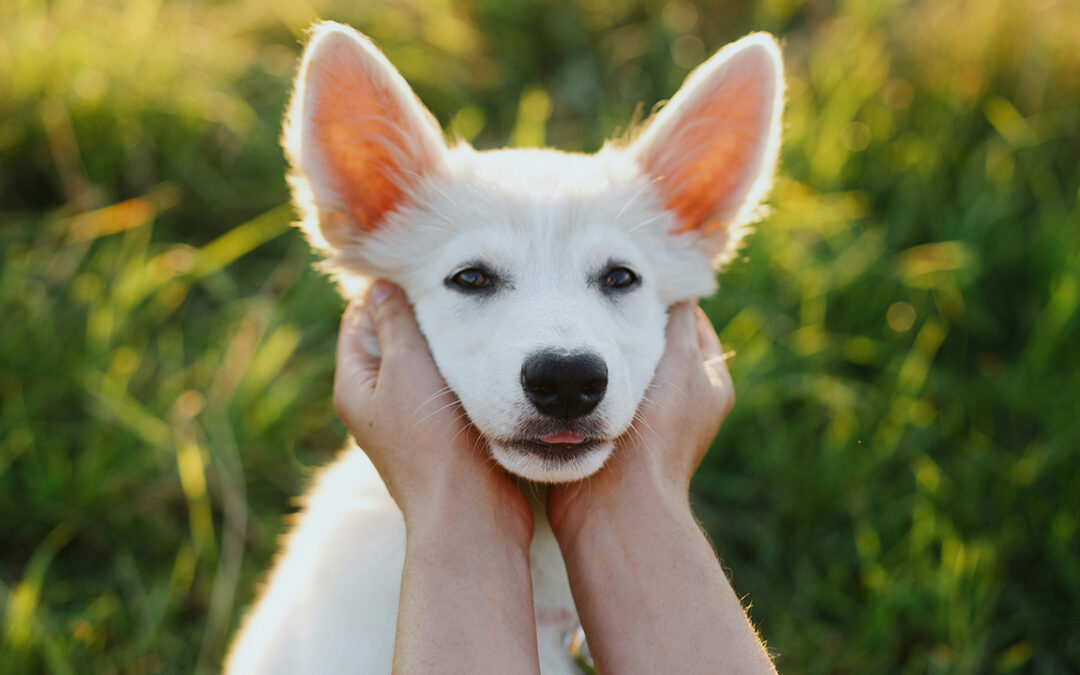You’ve decided to adopt a puppy – yay! But, what now? Your puppy’s first few weeks in its new fur-ever home are vital to them growing up calm, confident, and as open to new people and experiences as possible. Although raising a puppy can be exhausting at times, consistency is key and will certainly pay off in the long run.
Puppies (and kittens) have what is known as a ‘socialisation period’, which lasts until they are around 14 weeks of age. This is an essential learning phase for young animals, and can have a significant effect on their behaviour down the track. It’s also an important period of bonding between you and your new family member. Our goal during this socialisation period should be to introduce them to as many new and positive experiences, making sure not to overwhelm them in the process. An example – if you would like your puppy to be great with other dogs, introducing them to a friend or family member’s friendly dog in a safe and familiar environment is a great idea! But a dog park with lots of strange dogs, people, sights, and sounds? This might be a little too much for them to handle early on, and the whole experience might end up having the opposite effect that you were hoping for.
Don’t forget – your puppy’s vaccinations should be up-to-date before introducing them to other dogs, or taking them out into the big wide world.
Mouthing, or play-biting, is a normal developmental behaviour for puppies. But their sharp little teeth can hurt! If your puppy mouths your skin, you can try yelping like another puppy would to let them know that they’re biting too hard. If they don’t stop? Definitely don’t encourage them! Stop play instead – this will teach them that play-biting ruins the fun. Once they’ve stopped, you can reward them with something else to chew on (other than you, of course), like a treat or toy.
Chewing is another normal behaviour – it’s how your puppy explores its new world. Puppies will be ‘teething’ from around 4 to 6 months of age. At this time, we often see an increase in chewing behaviour as it helps to relieve some discomfort. Rule number one? Keep easily chewable items (like shoes) up high or out of reach (unfortunately, this habit can take some getting used to). If you do catch your puppy with something they shouldn’t be chewing on, calmly take it away and offer them an exchange – a toy they’re allowed to chew on is a great option! It’s all about teaching them what they can and can’t do. Remaining calm is super important – too much excitement and your puppy might think it’s a game, which is likley to encourage them. Punish them, and they will only learn to hide the behaviour from you. And why are shoes so popular you ask? It’s because they smell great!
Toilet training is a big one! Make sure you’re always supervising your puppy when they’re inside, and take them outside every couple of hours, as well as after eating, sleeping, or playing. Have an area outside that you regularly take them to so that they learn where they should go. Give them lots of praise if they do the right thing. If they do the wrong thing? Calmly take them to the right place and start praising them for doing the right thing in the right place. You can even try using trigger words (just like telling them to ‘sit’) when they go – you might be able to get your puppy toileting on command! (‘Twinkle’ was a family favourite growing up.)
Training your puppy is really all about ignoring any behaviours you don’t want to encourage, and rewarding those you do. Punishing your pet will generally only make them fearful, and teach them to hide bad behaviour from you. Get creative with rewards! Food, praise, toys, games, attention – anything they enjoy. Physical and mental stimulation throughout your pet’s life will also help to reduce unwanted behaviours at home. And remember, training needs to be done in the moment (not when you find the chewed up shoe hours later) – good supervision and consistency are essential to ensuring your puppy is happy and well-behaved in their new home!


